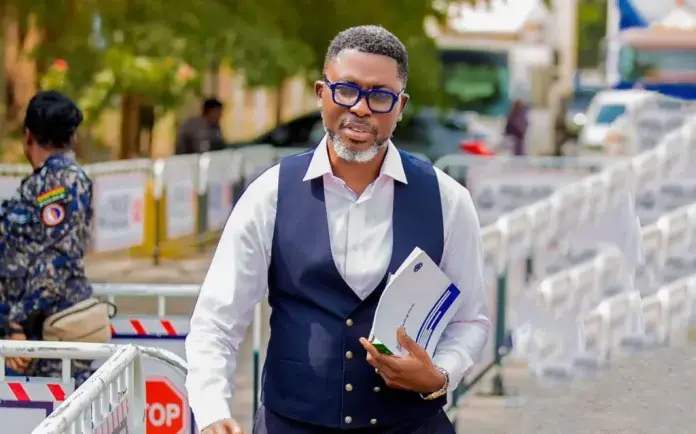By Ghana News,Peter Agengre
Copyright ghananewss

Gomoa Central Member of Parliament Kwame Asare Obeng has dismissed persistent speculation that his historic 2024 parliamentary victory was bankrolled by Kennedy Ohene Agyapong, revealing instead that he actually provided financial support for the former New Patriotic Party (NPP) presidential aspirant’s campaign.
The musician turned politician, widely known as A Plus, addressed the funding rumors during a panel discussion on UTV’s United Showbiz on Saturday, insisting his victory as an independent candidate came through self financing rather than external backing from the outspoken Assin Central MP.
“I gave Kennedy Agyapong more money for his primaries and I mobilized a lot of resources for him. Even the Ghana Journalists Association (GJA) President, Albert Dwomfuor, has admitted that I contributed significantly to his campaign for the GJA presidency,” A Plus stated, reversing the narrative about who funded whom.
The clarification comes after months of speculation linking Kennedy Agyapong to A Plus’s campaign finances, particularly given their known friendship and the independent candidate’s stunning defeat of an incumbent NPP minister. “I speak from my pocket, and I used my own money to win my seat. Kennedy Agyapong is my friend, but he had no hand in funding my campaign,” he emphasized.
A Plus made history on December 7, 2024, by unseating Naana Eyiah Quansah, the incumbent MP and Deputy Minister for the Interior, in one of the Central Region’s most closely watched contests. Official results from the Electoral Commission show he secured 14,277 votes out of 36,026 total valid votes cast, defeating Quansah who garnered 11,637 votes, while National Democratic Congress candidate Yawson Mohamed came third with 10,112 votes.
The victory margin of over 2,600 votes represented a significant achievement for an independent candidate challenging both major parties’ machinery and resources. Independent candidates historically struggle in Ghana’s parliamentary elections, making A Plus’s success particularly noteworthy and spurring questions about his campaign financing.
His assertion that he financially supported Kennedy Agyapong’s presidential primary campaign adds interesting context to their relationship. Kennedy Agyapong contested the NPP’s 2024 presidential primaries, eventually losing to Vice President Mahamudu Bawumia in what became a contentious race. The primaries required substantial financial resources for campaigning across Ghana’s regions.
A Plus’s mention of contributing to Albert Dwomfuor’s GJA presidential campaign suggests a pattern of political engagement and financial support extending beyond his own electoral ambitions. These contributions, if verified, would demonstrate financial capacity consistent with his claims about self funding his parliamentary campaign.
The musician’s transition from entertainment to politics followed years of political commentary and activism. He gained prominence for criticizing government corruption and supporting various political causes, building a public profile that eventually translated into electoral viability when he decided to contest the Gomoa Central seat.
His decision to run as an independent candidate rather than seeking a major party ticket proved strategically sound. The independent label allowed him to appeal across partisan lines in a constituency where neither the NPP nor National Democratic Congress held overwhelming advantages, while his celebrity status provided name recognition that party backing might not have enhanced significantly.
Following his election, A Plus expressed his intention to align with the National Democratic Congress in Parliament, though he maintains his independent status technically. This alignment gives him access to parliamentary resources and committee positions while preserving flexibility on issues where he might disagree with NDC positions.
The funding speculation he addressed likely stems from assumptions that independent candidates lack resources to compete with party backed opponents who access party machinery, volunteer networks, and financial support from national organizations. His victory over an incumbent deputy minister seemed implausible without significant backing, leading observers to theorize about secret sponsors.
Kennedy Agyapong’s reputation for political patronage and financial muscle made him a logical suspect for those seeking to explain A Plus’s campaign resources. The Assin Central MP is known for supporting various political causes and individuals, making speculation about his involvement in A Plus’s campaign plausible even if ultimately incorrect.
A Plus’s emphatic denial serves multiple purposes beyond simply correcting the record. It establishes his independence from powerful political figures, strengthens his credibility with constituents who elected him partly because he wasn’t seen as beholden to political godfathers, and demonstrates financial capacity suggesting he can remain independent going forward.
Whether voters care about campaign funding sources depends partly on outcomes. If A Plus serves Gomoa Central constituents effectively, how he financed his campaign becomes less relevant than what he delivers in Parliament. However, establishing his independence matters for maintaining the political brand that got him elected.
His friendship with Kennedy Agyapong doesn’t appear damaged by the clarification. A Plus framed their relationship positively while simply correcting misconceptions about financial flows between them. This approach preserves the relationship while addressing rumors that might have complicated his parliamentary work.
The speculation about external funding reflects broader questions about how independent candidates sustain campaigns without party infrastructure. A Plus’s entertainment career presumably provided financial resources that typical independent candidates lack, explaining his capacity to self fund without requiring wealthy sponsors.
His success may inspire other independent candidates in future elections, though replicating it requires similar combinations of celebrity status, financial resources, political networks, and constituencies where major parties show vulnerability. These factors don’t align frequently enough to make independent candidacies routinely viable.
For now, A Plus has stated his position clearly: he funded his own campaign, supported Kennedy Agyapong’s presidential bid rather than receiving support from him, and won his seat through personal investment and effort. Whether this settles the speculation or simply generates new questions about his financial capacity remains to be seen.